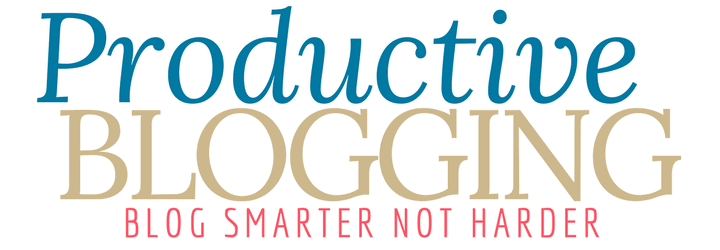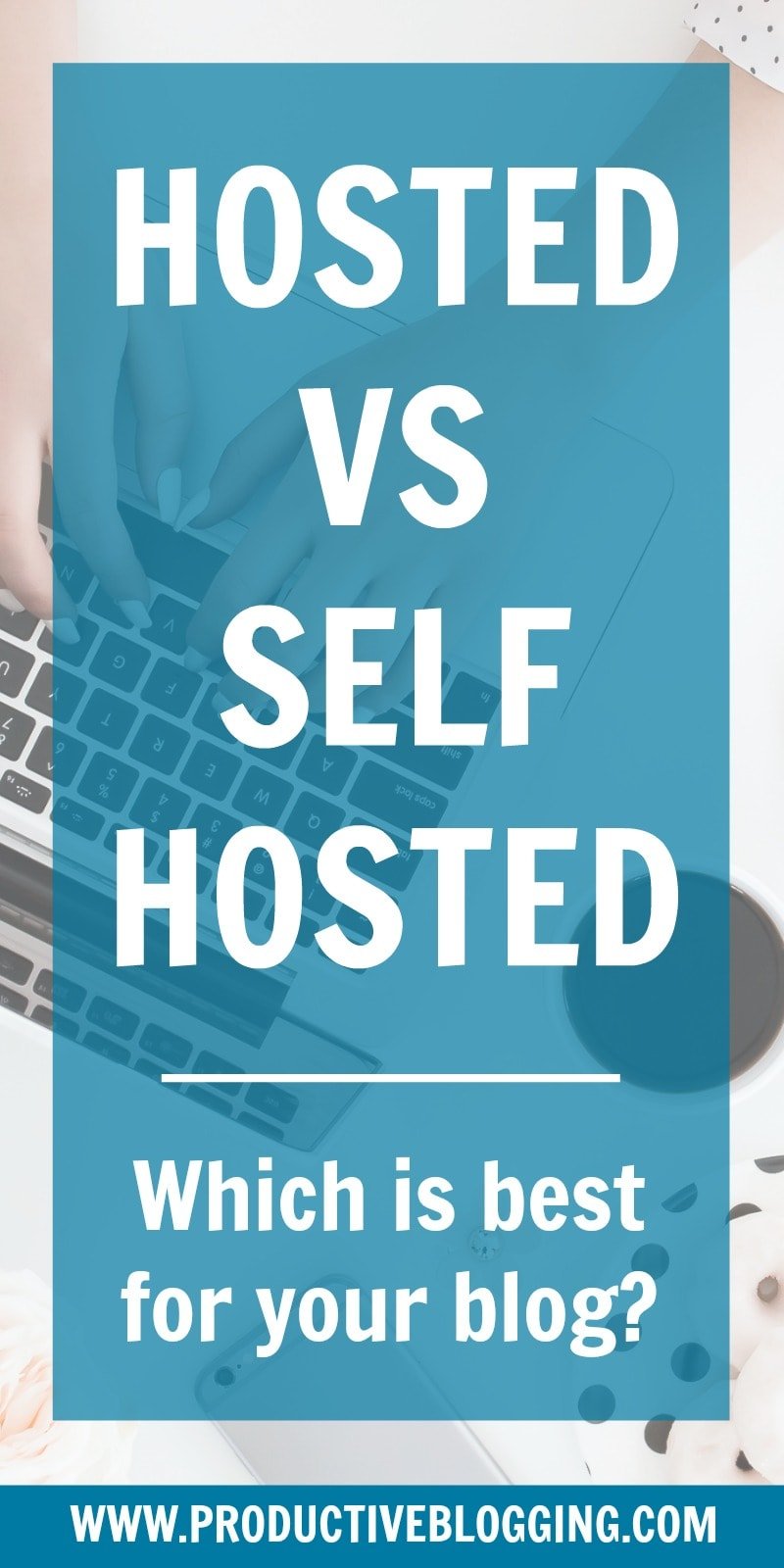Hosted vs self-hosted: which is best for your blog?
I may get paid commission for purchases made after clicking a link in this post.
What is the difference between a hosted blog and a self-hosted blog? And which one should you choose? Find out in this article – Hosted vs self-hosted: which is best for your blog?
If you are thinking about starting a blog, one of the first decisions you will have to make is whether to opt for a hosted solution (such as Blogger, Wix, Squarespace or WordPress.com) or whether to go self-hosted (WordPress.org).
Both options have pros and cons, and either one could be right for you, depending on what kind of blog you want and what your ultimate dreams and ambitions are for your blog.
In this article I am going to look at the advantages and disadvantages of each option to help you make the decision between hosted and self-hosted.
But first – what exactly is the difference between a hosted blog and a self-hosted blog?
Hosted vs self-hosted: what’s the difference?
What is a hosted blog?
With a hosted blog, you are essentially getting a one stop shop solution. You deal with one company and get your domain name (e.g. productiveblogging.com), hosting (where your blog ‘lives’) and blogging software (all the stuff that makes the blog work) all from that one company.
This makes things simple (they sort everything out/only one company to deal with). But it’s also restrictive (for example, they can restrict what you can do with your blog and how much, if any, money you can make from your blog). It’s also slightly risky – technically they own your blog and could delete it if they feel it is in violation of their terms of service.
Hosted options include Squarespace, Wix, Blogger and WordPress.com
What is a self-hosted blog?
Self-hosted blogging is more of a DIY solution. You buy a domain name, pay for someone to host it, and install the software (WordPress.org) yourself. Though these days, a good host will do all this for you or at least help you to do it.
This makes things slightly more complicated (more companies to deal with, more moving parts), but gives you more flexibility (you can pretty much do anything you like with a self-hosted blog) and more security (you own your blog, no-one can take it away from you). There are a number of self-hosted options, but most bloggers opt for WordPress.org.
WordPress.org is basically the software (technically a content management system or CMS), you then have to pay a for a host (where your blog lives). Hosts include names like SiteGround, BlueHost, GoDaddy, BigScoots etc.
Hosted vs self-hosted: pros and cons
Now we are straight on what the difference between a hosted and a self-hosted blog is, let’s look at the advantages and disadvantages of both options.
Hosted Blog: Pros
Low cost
The biggest advantage of a hosted blog is the price – you can start a basic Blogger, Wix or WordPress.com blog for free. You can start Squarespace Blog for $16 per month**. (However, with all of these hosted options, if you want premium features, such as a custom domain name, there will be extra charges – see ‘cons’)
Easy to use
The other great advantage of hosted blogs is the simplicity. It’s quick and easy to create a blog and you don’t have to worry about the technical side of things such as hosting, maintenance and software updates – this is all taken care of by the platform you choose.
Hosted Blog: Cons
Hidden ‘extras’
Although it is possible to get a hosted blog for free – there will almost certainly be charges for anything above and beyond a very basic setup. For example, you will have to pay if you want your own domain name (e.g. www.example.com rather than www.example.blogspot.com). You will also have to pay if you want to upgrade the design of your blog or if you want extra functionality. You may also have to pay extra if you want to monetize your blog and if you want to remove the ads (ads which make money for your host not you, that is!). What starts off as a ‘free’ blog can get expensive!
Lack of functionality
With a hosted blog, you are restricted as to what you can do with your blog. Sure, most hosted blogging platforms have a whole raft of built in options that you can use, but you are broadly stuck with what that hosted solution offers. If they don’t offer a particular function, you can’t have it, and that’s that.
Restrictions
With a hosted blog, you are restricted by the platform’s terms of service – this means you can’t do what you like with your blog. There may be restrictions on the type of content you can post, and how you are allowed to monetize your blog. And, if you violate those terms of service, the host would be within their rights to DELETE YOUR BLOG – a rather scary thought!
Lack of control
With a hosted blog, you are at the mercy of the whims of your hosting platform. If they decide to make a change that affects your blog, they can do that, and you don’t really have a whole lot of say in it.
All your eggs in one basket
The advantage of having everything in one place is also a big disadvantage. With self-hosted blogging, if you have a problem with one aspect of your blog, you can easily change it. With hosted blogging it’s a very different story. If you have a problem with one aspect of your blog, you are limited to the solutions your blogging platform offers.
Support
If everything’s going smoothly, then all is well. But what if you have a problem and your host starts being difficult or says they can’t help? With a self-hosted blog, you could just move to another host. With a hosted blog you are pretty much stuck (unless you decide you want to move to a whole different blogging platform).
And with some lower levels of hosted blogging, there is actually no support at all!
Lack of professionalism
Out of the box, most hosted blogging options – especially the free ones, don’t look very professional. If you want to make them look more professional, you need to either learn how to code or spend money on a web developer to customize them. Even then, hosted blogs are generally perceived as being less professional than self-hosted blogs.
Obviously if you are blogging as a hobby, this is not too much of a problem, but if you intend to make money blogging, you should seriously consider going self-hosted.
Self-Hosted Blog: Pros
Complete flexibility
This is a big advantage of having a self-hosted blog. You can do pretty much anything you like with it (so long as it’s legal and humanly possible). There are no real limits. This means you can make your blog look how you want, add any functionality you want and monetize your blog as you want.
This also means if you don’t like one aspect of your blog, you can easily change it – you are not restricted to what one particular blogging platform has to offer.
Total control
With a self-hosted blog, you also have total control over your blog. No one can make a change to your blog unless you let them.
Access to plugins
The truly amazing thing about a self-hosted WordPress blog is that there are thousands of plugins you can get for free that will allow you to do almost anything you want with your blog – you don’t need to code it yourself or pay someone to do it. Obviously, there are some plugins you have to pay for, but in most instances you can find a free plugin which will do the job.
Access to custom themes
Themes are like a design template for your blog. You simply install it on your blog and you can quickly and easily change colours and other design elements to suit your requirements. All the hard work of making it look good has been done by a professional designer – all you have to do is tweak it to make it look just how you want. With a self-hosted blog, you are not limited to what any one blogging platform has to offer in terms of design – you are free to choose from thousands of options.
Alternatively, if you want to, you can pay a designer to design your website to your exact specifications.
Better for Search Engine Optimization (SEO)
All this flexibility and access to plugins, means you can easily make the necessary adjustments to optimize your blog for search engines. If you get your SEO right, search engines can bring in really amazing levels of traffic – meaning greater potential revenue. Having a self-hosted WordPress blog also means you can get the Yoast SEO Plugin – an incredible FREE plugin that will help you optimize your blog and improve your search engine rankings.
Low cost
While starting a self-hosted blog is not free, it is still a low-cost option. To get started you only have to pay for your domain name (usually about $15 per year**) and hosting (you can get a basic hosting package* for around $7 per month**).
Support
If you get a good host, they can offer incredible support when you get stuck. (And if they don’t, you can simply move your website to a host that does offer good support*). Additionally, there is usually support available for individual plugins and themes. If one plugin or theme developer is not being very helpful, you can simply delete that plugin and get a different plugin to do the same job. You are not stuck with only one option!
More professional
Self-hosted blogs are generally seen as more professional than hosted blogs. This means you appear more professional to your readers and potential clients, leading to greater opportunities for monetization in the future.
Easier to make money
Whilst it is possible to make money on a hosted blog, the lack of restrictions, availability of plugins and better SEO mean it is much easier to make money with a self-hosted WordPress blog and your potential for making really good money is much greater.
Leaves your options open
Because of the flexibility of going self-hosted, you leave your options open for the future. Right now, you may just want to start a blog, but what if in the future you want to turn your blog into a business? Open a shop on your website? Build a membership site? Sell online courses? Have clients book appointments? All that is possible on a self-hosted WordPress site.
An enormous community
Over 40% of the world’s websites are built on WordPress – and not just blogs, many big corporations use WordPress.org for their websites too. This means there is a huge community of WordPress users out there who you can turn to if you have a problem or a question. It also means that there is a huge amount of help and resources online available to self-hosted WordPress bloggers. And it means WordPress.org tends to be ahead of the game with new developments in technology.
Self-Hosted Blog: Cons
It’s not free
Whilst starting a self-hosted WordPress blog is a low-cost option it’s not free. As I outlined above, as a bare minimum you have to pay for your domain name and hosting fees. As your site grows, you may also choose to buy a premium theme and premium plugins to make your site look more professional and to maximize your blogs chances of making money.
A bigger learning curve
There is definitely a greater learning curve with having a self-hosted blog. However, it’s not as technically complicated as it is sometimes made out to be. Once you understand the basics, the day to day running of a self-hosted WordPress blog is actually pretty straightforward.
Greater responsibility
With a self-hosted WordPress blog, you are responsible for everything – renewing your domain name registration, arranging hosting, installing the software, making backups, updating plugins and website security. Whilst most of this is pretty straightforward (updating a plugin = clicking a button, website security involves installing a plugin and a good host* will help with your domain name, installing the software and backups), you do have to do it yourself, whereas all this is usually taken care of by the blogging platform if you opt for a hosted blog.
More moving parts
If you have a self-hosted blog there are more companies to deal with – theme developers, plugin developers, your hosting company etc. This is in comparison to a hosted blog where you only have one company to deal with. This does add an extra layer of complexity… though it can also be an advantage, as it means if you have a problem, as there is often more than one person to turn to.
Hosted vs self-hosted: which is best for your blog?
If you are certain that blogging will only ever be a hobby and/or if you are not sure whether blogging is right for you, and if you are not bothered by the potential restrictions, then a hosted blog might be the right choice for you.
However, if you are starting a blog with the intention of making money and growing a business, or if you think you might want to make money with your blog in the future, I would definitely advise you to start a self-hosted WordPress blog.
A self-hosted WordPress blog is still a low-cost option and it is not as complicated as it is often made out to be (if I can do it, you definitely can! I knew nothing about websites when I got started, nor was I especially tech savvy). You also open up much greater possibilities for creating the blog you want and much greater opportunities to make money and grow your blog into the thriving business you want it to be.
Need help to set up a self-hosted WordPress Blog?
Want help to start a new self-hosted WordPress blog? Read my guide to starting a self-hosted WordPress from scratch, where I take you step by step through the process.
Want a full plan that takes you through everything you need to do in the the first 7 weeks of blogging – including what you need to do BEFORE you start a blog? Then check out my my FREE guide to starting a PROFITABLE blog.
Want a course that will take you step by step through everything you need to do to START and GROW a PROFITABLE blog the RIGHT way – including screengrabs, video tutorials, cheatsheets, worksheets, planners and more? Then check out my Profitable Blogging Jumpstart Course!
- How to choose the right niche for your blog
- How to choose the perfect blog name
- 9 essential things to do before starting a blog
- How to choose the right host for your blog
- 35 BIG mistakes new bloggers make (and how to fix them!)
Don’t miss a thing!
Follow me on Twitter, Facebook and Instagram. Or why not subscribe to Productive Blogging and get blogging and productivity tips straight to your inbox every week?
Pin this post to read later
*This blog post contains affiliate links, this means if you click on a link and go on to buy the product I recommend, I will get a small commission, but you will not be charged a penny more – thanks in advance!
**Prices correct at 22/08/22










could you explain that please,
” You may also have to pay extra if you want to monetise your blog and if you want to remove the ads (ads which make money for your host not you, that is!). What starts off as a ‘free’ blog can get expensive! “
and I really want to know why is better in monetize doesn’t blogger make money like wp?
“However, if you are starting a blog with the intention of making money and growing a business, or if you think you might want to make money with your blog in the future, I would definitely advise you to start a self-hosted WordPress blog.”
You can make some money on hosted blogging plans… but it’s usually a lot less than on self-hosted! If your main reason for starting a blog is to make money, then you would be much, much better off going self-hosted, as you will make a lot more money in the long-run. Hope that helps! Eb 🙂
Ok, so some hosted blogging platforms won’t let you make money on the basic/free plan – to be able to monetise your blog you need to upgrade to a premium plan. There are also some hosted blogging platforms which show ads on your site when you are on the basic/free plan – but it’s the host that makes money from those ads, not you. To remove the ads you have to pay to upgrade your plan. What I am really saying in this section is going with a hosted blogging platform may seem free – but there are often hidden costs and/or you can’t make money on the free plan. If you want to make money with your blog, you really need to go self-hosted. It’s a little more expensive upfront but the money making potential is waaaay higher!
This article has been really helpful. Thank you. I looked into both WordPress hosted and WP self-hosted. I’d decided to go with the self-hosted option anyway but it was looking at all the plugins available for WP last night that made me realise just how much more flexibility there is with self-hosted! It makes total sense to have the power to adapt your site as you want/need as your blog grows. I’m excited to start building my site.
Yay! I am so happy to hear you found this article helpful. And welcome to the wonderful world of blogging – you have definitely made a good choice going self-hosted! Eb 🙂
I realize that a free blogging website like Blogger / Blogspot leaves the blogger at the mercy of Google one day just shutting it down without what may seem a justifiable reason, but even hosted websites can leave the blogger in a similar situation eventually. For example, I had five blogs on a shared or baby account with HostGator for over a decade, and eventually I had at least a couple of thousand posts on the smallest of the websites.
Toward the end of my account’s life, I was making posts in excess of 30,000 words that would take me a few weeks to complete, and there would be scores of images in them, usually thumbnail in size.
But even though my websites used Cloudflare and had free Wordfence protection, sometimes I would be told that Wordfence had blocked several thousand attempts by specific suspicious IPs.
Over the years, HostGator would at times take my account offline for period of time for violations of overusing shared resources until I finally met some condition of theirs, but I had retired in early April 2011 and would never be able to afford their ultimate push to upgrade to a dedicated as opposed to a shared account.
I had originally begun the websites in the hope of making a second income through affiliate means, but I was never any good at it. Google even banned three of the websites from displaying AdSense because of various violations that in a couple of cases should not even have applied to me because the violations were supposed to be strictly applied against U.S.-based websites and their owners whereas I was Canadian and lived in Canada ─ not the U.S.
But I didn’t know how to object or protest and get myself heard ─ Google always did that sort of thing anonymously, so one never knew who to contact about it to explain.
To cut this short, HostGator finally shut me down again for overuse of resources due to excess traffic that they admitted was likely of a bot or related nature, but I couldn’t understand their bewildering and wretchedly time-consuming remedies. This was in the Fall of 2020, and two of my websites had been online since 2008.
I had my 71st birthday in October of 2020. My sole income is a monthly pension. I had spent virtually hours and hours every day working on one or another of my websites, but I accepted that it had all been for naught ─ I was defeated. So I let the account lapse (I had been paying to have it hosted on a month-by-month basis after finding that I no longer could afford the hit to my credit card for each renewed subscription).
I also let the domains go ─ all except for the two that could still advertise Google AdSense ─ I now have them hosted at InterServer. But I abandoned the entire database at HostGator ─ the shared account was too huge for me to be able to get a download of the database for the account on my own. My account’s total volume for the five websites or domains was over 11GBs, whereas the maximum HostGator allowed a customer to download on their own was 10GBs.
I would have needed to request someone at HostGator to handle it for me, and I just wanted to be done with them once and for all. And so I decided that I would start all over with those two domains and give them my focus instead of spreading it out over five other websites like I had been doing.
So where am I going with this long narrative?
Well, I have had a free Blogger blog of a personal nature since September 2008 that has over 3,200 posts, and an offshoot of that blog that is a couple of years old with over 600 posts.
Yes, Google could shut down either one of them if someone decided that some manner of unforgivable violation was going on, but I have never received any warnings. As I said, these are personal blogs ─ I began the first one in order to begin a journal of my life after my immigrant wife’s two sons finally came to live with us after a couple of years of trying to get them visas.
I have since had to render that blog private because the youngest lad ─ who had aged from around 10 years old when he came to Canada to around the age of 20 when he learned of my blog ─ discovered its existence, and I had been freely naming family members in all that while. So I went dark. The second blog was begun anonymously, and more or less carried on from where I had gone dark with the first blog.
But now I name no one in the second blog ─ it truly is anonymous. And the private blog has become a venue for me to post entries from an old journal of mine that I began to keep way back in 1973 when I was 23 years old. The plan ─ provided I live to see it happen ─ is that one day I will again make the blog public, but that will have to be once it has been private for maybe a decade and my two stepsons will have grown older and not much care anymore about their earlier history up to when I had to make the blog private.
I hope that the blogs will live on after I am gone ─ that is my ultimate aim. This is an impossibility with a hosted website, unless a person has the financial means to perhaps put the hosting subscription into a will and have it maintained. But a free blog like Blogger will likely remain online for as long as Blogger exists as a free platform, unless Google one day decides to weed out inactive older blogs. As yet, they do not. Every discontinued old blog that was online when the owner quit posting into it is still available to find.
Anyway, this is one strong (to me) reason why a free blog can be superior to a hosted website that is used as a blog.
Who knows? Maybe one day I can afford a domain in the decentralized Web that will be mine for life, and I can get my two blogs set up there before I’m gone and it’s too late. But that venue is far too mysterious to me ─ it seems entirely focused around virtual currency like Bitcoin, and that’s way out of my reach and thus of little interest. I’m waiting for this new version of the Internet to be more broadly accessible and clearer of concept.
Perhaps I’ll see that day.
It’s true that hosting companies can take you offline if you go over your limits, but you still own your blog – you can simply move to a different hosting company or, if you prefer, pay for an upgrade. One thing I always recommend to bloggers is to always have a backup of their blog somewhere separate to their host… that way, if ever your host is the problem, you still have a copy of your blog which you can move to another host, if necessary. I personally get VaultPress to do a backup of my blog every day. That way, the most I can ever lose is one day’s blogging work. Eb 🙂
This sentence confused me, “Even then, hosted blogs are generally perceived as being less professional than hosted blogs.” I’m guessing you mean, “Even then, hosted blogs are generally perceived as being less professional than self-hosted blogs?”
Ooops! Good spot. That was a typo. My apologies – it’s now been corrected. You were absolutely right… I meant hosted blogs are generally perceived as being less professional than self-hosted blogs. Thanks so much for highlighting this. I hope you enjoyed the rest of the article. Eb 🙂